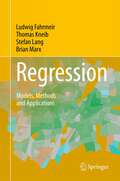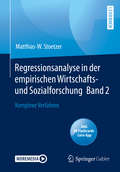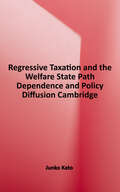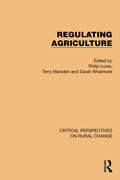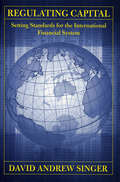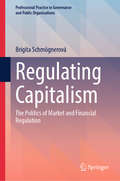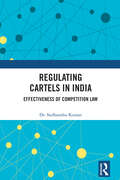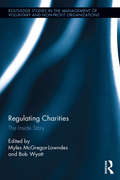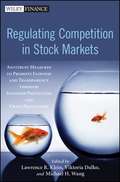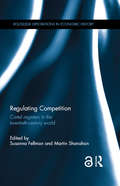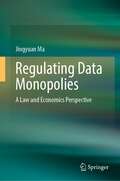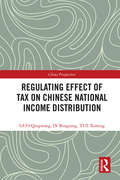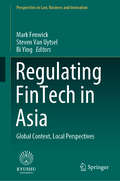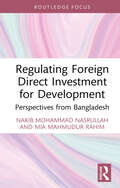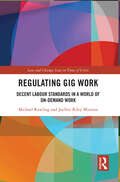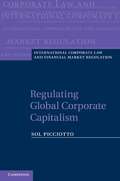- Table View
- List View
Regression: Models, Methods and Applications
by Brian Marx Ludwig Fahrmeir Stefan Lang Thomas KneibThe aim of this book is an applied and unified introduction into parametric, non- and semiparametric regression that closes the gap between theory and application. The most important models and methods in regression are presented on a solid formal basis, and their appropriate application is shown through many real data examples and case studies. Availability of (user-friendly) software has been a major criterion for the methods selected and presented. Thus, the book primarily targets an audience that includes students, teachers and practitioners in social, economic, and life sciences, as well as students and teachers in statistics programs, and mathematicians and computer scientists with interests in statistical modeling and data analysis. It is written on an intermediate mathematical level and assumes only knowledge of basic probability, calculus, and statistics. The most important definitions and statements are concisely summarized in boxes. Two appendices describe required matrix algebra, as well as elements of probability calculus and statistical inference.
Regressionsanalyse in der empirischen Wirtschafts- und Sozialforschung Band 2: Komplexe Verfahren
by Matthias-W. StoetzerDieses Lehrbuch ist der Folgeband zu „Regressionsanalyse in der empirischen Wirtschafts- und Sozialforschung Band 1“. Es richtet sich an Studierende und Wissenschaftler, die im Rahmen einer Forschungsarbeit Daten analysieren oder vorhandene empirische Publikationen auswerten müssen. Regressionsanalysen stellen die wichtigsten Verfahren zur Untersuchung empirischer Fragestellungen in den Wirtschafts- und Sozialwissenschaften dar. Im Unterschied zu anderen ökonometrischen oder statistischen Lehrbüchern verzichtet der Autor auf abschreckende mathematische Ausführungen. Alle Aspekte werden verbal und grafisch erläutert. Die Kapitel sind so aufgebaut, dass ein selbständiges Studium problemlos möglich ist. Lesende werden Schritt für Schritt in komplexere Verfahren eingeführt.Dabei sind sämtlichen Kapiteln die wichtigsten Lernziele und Schlüsselbegriffe vorangestellt. Jedes Kapitel schließt mit einer Reihe von Übungsaufgaben einschließlich Lösungen. Praxisorientiert werden alle Regressionsverfahren und Tests anhand der Statistikprogramme SPSS und Stata sowie mittels Screenshots erklärt. Zusätzliche Fragen per AppLaden Sie die Springer Nature Flashcards-App kostenlos herunter und nutzen Sie exklusives Zusatzmaterial, um Ihr Wissen zu prüfen.
Regressive Taxation and the Welfare State: Path Dependence and Policy Diffusion (Cambridge Studies in Comparative Politics)
by Junko KatoPolitical economists have viewed large public expenditures as a product of leftist government and the expression of a stronger representation of labor interest. The formation of governments' funding bases is a topic that has not been thoroughly explored, and this book sheds important new light on the issue of taxes and welfare. Beginning with a clarification of the development of postwar tax policies in industrial democracies, Junko Kato finds that the differentiation of tax revenue structure is path-dependent upon the shift to regressive taxation. Kato challenges the conventional belief that progressive taxation leads to large public expenditures in mature welfare states.
Regtech at HSBC
by James Weber Jonas Heese Aiyesha DeyMark Cooke, Global Head of Operational Risk, needed to decide between a traditional regulatory control system and a new regtech system to manage non-financial risks. Non-financial risks failures such as money laundering and tax evasion had cost HSBC billions of dollars in fines and settlements over the previous decade. In response, HSBC had hired thousands of risk and compliance staff and invested billions in traditional control systems. Cooke, however, could not be sure HSBC's traditional methods were sufficient and he was worried they were not sustainable. Cooke recently ran a pilot test of a regtech solution that promised to warn of problem areas in advance, and do so at a much lower cost than traditional systems. The regtech solution provider was a small startup and the technology was not fully developed. Cooke wondered how much he could trust a technology from a startup company with a handful of employees and almost no revenue to meet the needs of a world-leading bank with global operations.
Regulating Agriculture (Critical Perspectives on Rural Change #5)
by Sarah Whatmore Philip Lowe Terry MarsdenOriginally published in 1994, this volume brings together a set of essays reflecting the complex political, social and institutional problems encountered by modern states in seeking to manage their agricultural sectors. Drawing on different national and international viewpoints, the essays present original analyses of agricultural regulation in a comparative context. The aspects covered include the roots of the post-war food order; the roles of corporatism, agribusiness and technological change, the challenge of de-regulation and environmental reforms, the introduction of market principles and mechanisms into centrally planned economies and the efforts to forge a new order in international trade.
Regulating Banks in Central and Eastern Europe
by Aneta SpendzharovaHow do bank supervisors strike a balance between market self-regulation and pro-active regulatory intervention? This book investigates the choice of banking supervision approach in four European Union member states from Central and Eastern Europe - Bulgaria, Estonia, Hungary, and Slovenia - after their transition to democracy and market economy.
Regulating Business for Peace
by Jolyon FordThis book addresses gaps in thinking and practice on how the private sector can both help and hinder the process of building peace after armed conflict. It argues that weak governance in fragile and conflict-affected societies creates a need for international authorities to regulate the social impact of business activity in these places as a special interim duty. Policymaking should seek appropriate opportunities to engage with business while harnessing its positive contributions to sustainable peace. However, scholars have not offered frameworks for what is considered 'appropriate' engagement or properly theorised techniques for how best to influence responsible business conduct. United Nations peace operations are peak symbols of international regulatory responsibilities in conflict settings, and debate continues to grow around the private sector's role in development generally. This book is the first to study how peace operations have engaged with business to influence its peace-building impact.
Regulating Capital: Setting Standards for the International Financial System
by David Andrew SingerFinancial instability threatens the global economy. The volatility of capital movements across national borders has led many observers to argue for a reformed "global financial architecture," a body of consistent rules and institutions to prevent financial crises. Yet regulators have a decidedly mixed record in their attempts to create global standards for the financial system. David Andrew Singer seeks to explain the varying pressures on regulatory agencies to negotiate internationally acceptable rules and suggests that the variation is largely traceable to the different domestic political pressures faced by regulators. In Regulating Capital, Singer provides both a theory of the effects of domestic pressures on international regulation and a detailed analysis of regulators' attempts at international rulemaking in banking, securities, and insurance. Singer addresses the complexities of global finance in an accessible style, and he does not turn away from the more dramatic aspects of globalization; he makes clear the international implications of bank failures and stock-market crashes, the rise of derivatives, and the catastrophic financial losses caused by Hurricane Katrina and the events of September 11.
Regulating Capitalism: The Politics of Market and Financial Regulation (Professional Practice in Governance and Public Organizations)
by Brigita SchmögnerováInspired by Karl Polanyi's assertion that a self-adjusting market cannot persist without undermining the human and natural fabric of society, this book explores the critical role of market regulation in sustaining capitalism. It defends the thesis that "regulation is saving capitalism," while acknowledging the cyclical nature of market regulation: periods of regulation are often followed by waves of deregulation, creating &“a swinging pendulum&” phenomenon. Combining approaches from political economy and history of regulatory approaches in theory and practice, the book investigates the sensitivity of the pendulum to its driving forces incl. &“material causes,&” changes in a political power, competing interests, etc. It verifies the capacity of two main theories of regulation to explain this cyclical phenomenon. Part I. of the book examines, with a specific focus on regulation in the European Union, main goals of regulation, the redistributive effects of regulation, regulatory capture by vested interests including &“international policing mechanisms,&” risks of regulatory failure, the dangers of overregulation, and limits of self-regulation as well as questions the efficacy of the Better Regulation agenda. Part II. provides an in-depth analysis of financial regulation, it explores the key endogenous factors and some exogenous factors of financial instability (like COVID-19, climate change) which underline the need to regulate financial capitalism in order to maintain financial stability without jeopardising innovation, growth and competitiveness. It discusses the rapid evolution of European financial regulation since the 2007/8 financial crisis, including efforts to complete the European Banking Union, advance the European Capital Market, and promote Sustainable finance. Drawing on the author's scholarly as well as practical experiences as the former Deputy Prime Minister (1994) and Finance Minister (1998-2002) of the Slovak Republic, this book is written for both professionals in regulatory agencies and government institutions, as well as scholars with an interest in regulatory issues and economic policy.
Regulating Capitalism?: The Evolution of Transnational Accounting Governance
by Jochen Zimmermann Jörg R. WernerThis book charts the regulatory changes at the heart of capitalist economies; the financial reporting on financial markets. It is a unique contribution interconnecting issues both of contemporary political science and accounting research. The book contains in-depth descriptions of regulatory settings (and changes) in six countries: Canada, France, Germany, Japan, the United Kingdom and the United States and aims to takes a close look at drivers of change such as crises and globalization. The book also links these drivers of change with moderating institutional structures such as the legal and financial systems, but also the welfare states in place. Taken together, it shows how a trend to more transnationalization in accounting emerges but also its likely limits.
Regulating Cartels in India: Effectiveness of Competition Law
by Sudhanshu KumarThis book presents a comprehensive assessment of anti-cartel enforcement and investigative procedures in India. It makes a case for enhanced sanctions for cartel conduct in India. Cartels are considered the most pernicious violation of competition law, referred to as "cancer to the free market economy". While competition laws in most jurisdictions prescribe strict sanctions against cartels, Indian Competition Law provides only civil penalties, with an upper ceiling for proven cartel conduct. This volume assesses the effectiveness of anti-cartel enforcement of the Competition Commission of India (CCI). It explores investigative procedures of the CCI through multiple qualitative and quantitative indicators and the extent to which enforcement of anti-cartel laws in India has led to cartel deterrence. Further, it also examines the priorities and processes of the CCI in terms of anti-cartel enforcement, their sanctioning mechanism and their dependency of computation of penalty on varied factors. Featuring detailed case law studies and engaging data, this book will be an essential read for students and researchers of law and legal studies, competition law, corporate law, intellectual property law, and business law.
Regulating Charities: The Inside Story (Routledge Studies in the Management of Voluntary and Non-Profit Organizations)
by Myles McGregor-Lowndes Bob WyattIn this volume charity commissioners and leading charity policy reformers from across the world reflect on the aims and objectives of charity regulation and what it has achieved. Regulating Charities represents an insider’s review of the last quarter century of charity law policy and an insight for its future development. Charity Commissioners and nonprofit regulatory agency heads chart the nature of charity law reforms that they have implemented, with a ‘warts and all’ analysis. They are joined by influential sector reformers who assess the outcomes of their policy agitation. All reflect on the current state of charities in a fiscally restrained environment, often with conservative governments, and offer their views on productive regulatory paths available for the future. This topical collection brings together major charity regulation actors, and will be of great interest to anyone concerned with contemporary third sector policy-making, public administration and civil society.
Regulating China's Shadow Banks (China Perspectives)
by Qingmin Yan Jianhua LiChina’s shadow banking has been a top issue in the past few years. Scholars, policymakers, and professionals around the world are seeking deeper insight into the subject, and the authors had unique insight into the sector through their positions high up in the regulatory apparatus. "Regulating China’s Shadow Banks" focuses on the regulation of shadow banks in China and provides crucial information to demystify China’s shadow banking and associated regulatory challenges. This book defines "shadow banking" in the Chinese context, analyzes the impact of shadow banking on the Chinese economy, includes a full-scale analysis on the current status of Chinese financial regulation, and provides valuable advice on the regulation of China’s shadow banks.
Regulating Competition in Stock Markets
by Lawrence Klein Michael Wang Viktoria DalkoA guide to curbing monopoly power in stock marketsEngaging and informative, Regulating Competition in Stock Markets skillfully analyzes the impact of the recent global financial crisis on health and happiness, and uses this opportunity to put regulatory systems in perspective. Happiness is lost because of emotional and physical health deterioration resulting from the crisis. Therefore, the authors conclude that financial crisis prevention should be the focus of public policy.This book is the most comprehensive study so far on potential risks to the stock market, especially various forms of market manipulation that lead to mania and eventual crisis. Based on litigation cases from international stock markets, and borrowing multidisciplinary findings in the fields of finance, economics, accounting, media studies, criminology, legal studies, psychology, and medicine, this book is the first to provide thorough micro-level regulatory proposals rooted in financial reality. By focusing on securities trading, they apply antitrust measures to limiting monopolistic power that is used for the manipulation of investors' perception and monopolistic profit. These proposals are quantifiable, adjustable, inexpensive, and can be easily implemented by any securities regulating agency for real-time oversight and daily operations.The recommendations found here are intended to improve the fairness and transparency of the financial markets, thereby perfecting the market competition, protecting investors, stabilizing the market, and preventing crisesExplores how avoiding crises can to contribute to a more scientific, health aware, and civilized economic and social developmentWritten by a team of authors who have extensive experience in this dynamic field, including Nobel Laureate Lawrence R. KleinSince the founding of the first, organized stock exchange in Amsterdam 400 years ago, no systematic economic research results on stock markets have been implemented in stock market regulation around the world. Regulating Competition in Stock Markets aims to fill this void.
Regulating Competition: Cartel registers in the twentieth-century world (Routledge Explorations in Economic History)
by Susanna Fellman; Martin ShanahanCartels, trusts and agreements to reduce competition between firms have existed for centuries, but became particularly prevalent toward the end of the 19th century. In the mid-20th century governments began to use so called ‘cartel registers’ to monitor and regulate their behaviour. This book provides cases studies from more than a dozen countries to examine the emergence, application and eventual decline of this form of regulation. Beginning with a comparison of the attitudes to regulation that led to monitoring, rather than prohibiting cartels, this book examines the international studies on cartels undertaken by the League of Nations before World War II. This is followed by a series of studies on the context of the registers, including the international context of the European Union, and the importance of lobby groups in shaping regulatory outcomes, using Finland as an example. Section two provides a broad international comparison of several countries’ registers, with individual studies on Norway, Australia, Japan, Germany, Sweden and the Netherlands. After examining the impact of registration on business behaviour in the insurance industry, this book concludes with an overview of the lessons to be learnt from 20th century efforts to regulate competition. With a foreword by Harm Schroter, this book outlines the rise and fall of a system that allowed nations to tailor their approach to regulating competition to their individual circumstances whilst also responding to the pressures of globalisation that emerged after the Second World War. This book is suitable for those who are interested in and study economic history, international economics and business history. Chapter 10 of this book is freely available as a downloadable Open Access PDF at http://www.taylorfrancis.com under a Creative Commons Attribution-Non Commercial-No Derivatives (CC-BY-NC-ND) 4.0 license.
Regulating Corporate Human Rights Violations: Humanizing Business (Routledge Research in Human Rights Law)
by Surya DevaDespite the continuous addition of regulatory initiatives concerning corporate human rights responsibilities, what we witness more often than not is a situation of corporate impunity for human rights abuses. The Bhopal gas leak – examined as a site of human rights violations rather than as a mass tort or an environmental tragedy – illustrates that the regulatory challenges that the victims experienced in 1984 have not yet been overcome. This book grapples with and offers solutions to three major regulatory challenges to obligating companies to comply with human rights norms whilst doing business, and asks; why companies should adhere to human rights, what these responsibilities are, and how to ensure that companies comply with their responsibilities. Building on literature in the fields of law, human rights, business ethics, management, regulation and philosophy, this book proposes a new ‘integrated theory of regulation’ to overcome inadequacies of the existing regulatory framework in order to humanize business. This book will be of interest to scholars, students, researchers, policy makers and human rights activists working in the fields of Law, Business and Human Rights.
Regulating Data Monopolies: A Law and Economics Perspective
by Jingyuan MaThis book analyzes the business model of enterprises in the digital economy by taking an economic and comparative perspective. The aim of this book is to conduct an in-depth analysis of the anti-competitive behavior of companies who monopolize data, and put forward the necessity of regulating data monopoly by exploring the causes and characteristics of their anti-competitive behavior. It studies four aspects of the differences between data monopoly and traditional monopolistic behavior, namely defining the relevant market for data monopolies, the entry barrier, the problem of determining the dominant position of data monopoly, and the influence on consumer welfare. It points out the limitations of traditional regulatory tools and discusses how new regulatory methods could be developed within the competition legal framework to restrict data monopolies. It proposes how economic analytical tools used in traditional anti-monopoly law are facing challenges and how competition enforcement agencies could adjust regulatory methods to deal with new anti-competitive behavior by data monopolies.
Regulating Digital Markets: The European Approach (Palgrave Studies in Institutions, Economics and Law)
by Antonio Nicita Antonio ManganelliThis book illustrates the challenges that regulators and policy makers have faced in the transition from the ‘old’ network industries to the new digital ecosystem. It succinctly describes the evolution of digital economy, its main actors, notably global digital platforms, as well as its interactions, interdependences, and trade-offs. Eventually, it proposes insights about why public rules are needed, what kind of rules could be more effective, fair, and efficient, and who should pose and enforce them. The book is opened by an introduction, dealing with Digital Transformation, Big Techs, and Public Policies, which provides a general conceptual and thematic framework to the following analysis but could be also read as a stand-alone paper. The following chapters are grouped in two parts: I. The Evolution of Digital Markets and Digital Rights, and II. Regulating Big Tech’s Impact on Market and Society. The secondary title - the European approach – has a twofold meaning. It highlights the fact that this work has a clear focus on EU law and policy - although the economic and institutional issues addressed are global phenomena, common to all world’s economies. In addition, it also underlines that European digital policy is not yet complete and effective. This book intends to provide a small contribution to the ongoing policy making process, as well as to the wider academic and policy debate.
Regulating Early Years Service
by Peter BaldockThis work is designed for those needing to understand and comply with regulations for childhood education and care. The author relates his text to the new framework resulting from the Government's developing National Child Care Strategy. Specifically, it reflects the transfer of responsibility from social to educational services and the establishment of a new regulatory body, The Early Years Directorate, a new arm of OFSTED. Major controversial issues are elucidated and different standpoints are explained, but the book's main focus is on the need to establish a sound working relationship between the new regulatory regime, on the one hand, and proprietors, managers, practitioners and advisors on the other.
Regulating Effect of Tax on Chinese National Income Distribution (China Perspectives)
by Guo Qingwang Lv Bingyang Yue XimingThis book measures in details the department income distribution pattern among the governments, enterprises, and families in China during the years of 1978–2008; it measures and analyzes the distribution of Chinese factor income and residents’ income. In combination with Chinese taxation system and policy, it makes a deep research on the effect of factor income distribution on residents’ income distribution, the effect of taxation on factor income distribution, and the effect of taxation on residents’ income distribution. This book is favorable for answering why taxation’s regulation effect on income distribution in China is low, and why taxation reform is necessary.
Regulating FinTech in Asia: Global Context, Local Perspectives (Perspectives in Law, Business and Innovation)
by Steven Van Uytsel Mark Fenwick Bi YingThis book focuses on Fintech regulation in Asian, situating local developments in broader economic, regulatory and technological contexts. Over the last decade, Fintech – broadly defined as the use of new information technologies to help financial institutions and intermediaries compete in the marketplace – has disrupted the financial services sector. Like other 21st century technological developments, Fintech is a global phenomenon that plays out in local economic, political and regulatory contexts, and this dynamic interplay between global trends and local circumstances has created a complex and fast-changing landscape. Diverse stakeholders (most obviously incumbent financial service providers, tech start-ups and regulators) all pursue a competitive edge against a background of profound uncertainty about the future direction and possible effects of multiple emerging technologies. Compounding these difficulties are uncertainties surrounding regulatory responses. Policymakers often struggle to identify appropriate regulatory responses and increasingly turn to policy experimentation. Such issues add to the challenges for the various actors operating in the Fintech space. This situation is particularly fluid in Asia, since many jurisdictions are seeking to establish themselves as a regional hub for new financial services.
Regulating Financial Innovation: Fintech and the Information Deficit (EBI Studies in Banking and Capital Markets Law)
by Christopher RuofThis book explores the impact of 'Fintech' on the information asymmetry between the financial regulator and the markets. It details the growing regulatory mismatch and how Fintech exacerbates the “pacing problem”, where the regulator struggles to keep up with innovation. With information as a point of reference, the book adds a new perspective on the latest phenomenon in financial innovation and presents a novel framework for navigating structural changes in the financial sector. Based on this analysis, a number of proposals to reduce the information gap and avoid regulatory mismatch are discussed. Thereby, new and promising regulatory concepts, such as regulatory sandboxes and SupTech applications are also covered. This book provides a practical framework for regulatory responses to financial innovation. It will be relevant to researchers and practitioners interested in financial technology and regulation.
Regulating Foreign Direct Investment for Development: Perspectives from Bangladesh (Routledge Focus on Environment and Sustainability)
by Mia Mahmudur Rahim Nakib Mohammad NasrullahThis book offers a comprehensive overview of the relationship between Foreign Direct Investment (FDI) regulation and sustainable development in Bangladesh.It is widely accepted that FDI-induced development is essential for the growth of undeveloped economies, but it can create a conflict between the investors' goal of profit maximisation and the host state's pursuit of economic gains. FDI-induced development is especially important for the economy of Bangladesh, the focus of this book, which argues that a balanced regulatory approach is necessary to ensure that FDI benefits all stakeholders. In examining Bangladesh's FDI regulatory regime, the authors reveal that it is investor-centric and lacks a development-oriented approach. They discuss the relevant laws, practices, mechanisms, and institutions that govern the entrance regulations and incentives for foreign investment, as well as the protection of the environment and human rights, with special attention to labour rights, involuntary displacement, and the protection of both the investors and the state in which they invest. From this analysis, the book recommends reforms to introduce development as a primary goal while maintaining Bangladesh's appeal as an FDI destination.The book will be of interest to researchers, students, and academics in the fields of economics, politics, sustainable development, and economic growth. It will also be of great interest to FDI strategists, policymakers, negotiators, administrators, and legislators in creating a balanced regulatory regime to attract FDIs for development.
Regulating Gig Work: Decent Labour Standards in a World of On-demand Work (Law and Change)
by Joellen Riley Munton Michael RawlingDigital revolution demands new approaches to regulating work. The “Uberisation of work” is not in reality a new phenomenon. It reintroduces the practices of ‘on demand’ engagement of labour common prior to the development of continuing employment. What is new, however, is the capacity of digital technology to engage labour in ways that avoid characterization as employment according to the legal tests developed in the 20th Century. This book tackles the challenge of ensuring that the emerging tribes of ‘gig’ workers in labour markets across the globe are afforded decent standards of work. This book discusses how to provide decent conditions and safe working standards for on demand workers engaged through digital platforms. It interrogates the rise of gig work, and the legal strategies that might be engaged to deal with the risk that on demand work will fall and remain outside of employment protections. It draws on observations of practices across the globe, but focuses particularly on regulatory solutions developed in Australia. The book will be a useful reference to policy making and legal reforms to address vulnerabilities of gig workers.
Regulating Global Corporate Capitalism
by Sol PicciottoThis analysis of how multi-level networked governance has superseded the liberal system of interdependent states focuses on the role of law in mediating power and shows how lawyers have shaped the main features of capitalism, especially the transnational corporation. It covers the main institutions regulating the world economy, including the World Bank, the IMF, the WTO and a myriad of other bodies, and introduces the reader to key regulatory arenas: corporate governance, competition policy, investment protection, anti-corruption rules, corporate codes and corporate liability, international taxation, avoidance and evasion and the campaign to combat them, the offshore finance system, international financial regulation and its contribution to the financial crisis, trade rules and their interaction with standards especially for food safety and environmental protection, the regulation of key services (telecommunications and finance), intellectual property and the tensions between exclusive private rights and emergent forms of common and collective property in knowledge.
